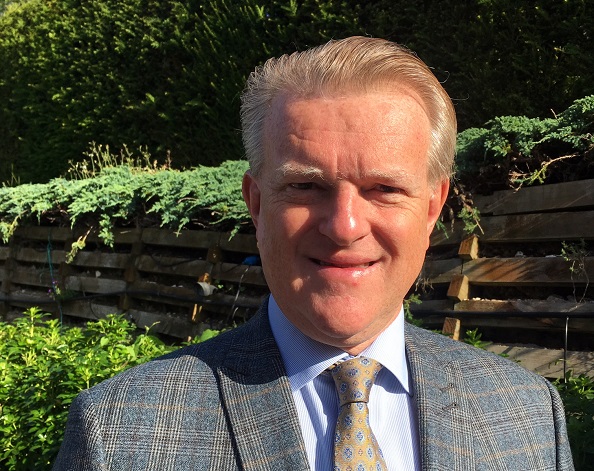
14 Aug 2019
Philanthropy: learning from the private equity world
Sixteen years ago Peter Cluff co-founded a successful private equity real estate firm, weathering the financial crisis in 2008 and flourishing in its wake. So why has he turned his ambitions to the third sector?
After 10 years at private equity firm Morgan Grenfell Private Equity, Peter Cluff co-founded private equity real estate firm Europa Capital, and over 16 years helped the company grow from nothing – becoming strong enough to survive the financial crisis and then flourish.
So why did he turn his ambitions to the third sector? Cluff, now chairman of Guildford Philanthropy, speaks to us about transitioning from helping entrepreneurs float business plans to encouraging local giving, and when he realised it was time to do something different.
Why did you decide to get involved in philanthropy?
Europa Capital linked up with The Rockefeller Group in 2010. We’d set Europa up from nothing, nearly lost it, survived the crisis, and ensured the company’s legacy.
I’d been going on the road ‘rattling tins’ for about 25 years. I realised it was time to use the experience I had gained to give something back, so I got involved in the Community Foundation for Surrey. It encourages local giving and tries to get people to exercise their philanthropic ideals. So if someone said: “I want to set up a swings and slides fund in Surrey,” I go: “OK, we’ll set the trust up for you and sift through grant applications.”
Why Guildford?
Joining the panel of Guildford Philanthropy, which is administered by the Community Foundation, opened my eyes to the other side of Guildford. It’s a very affluent town, with 203 streets where the average house price is over £1m. Yet we have 6,000 adults with no educational qualifications and parts of the borough with 40% child poverty. As a result the chasm between the haves and have nots in Guildford is wider than anywhere else in the country.
What changes have you made since joining the panel?
When I joined, I said: “I’ll take this on, but I have to run it my way.” The problem was that it had been set up with ‘the great and good’ local people on the panel but no one to roll their sleeves up between the quarterly meetings to actually get things done. You need people who can give their time and expertise on a more regular basis.
Raising awareness is the biggest challenge coupled with finding new innovative ways of raising money. Encouraging the local Council to set up a lottery to benefit the charity, getting the University of Surrey to lend support and persuading local businesses to help their local community were three of the first initiatives.
How has Guildford Philanthropy impacted the community?
In its first five years, it has made 46 grants helping 3,888 local people. The first grant was to the Guildford Bike Project. Bikes were donated, they had trained mechanics and they taught skills to unemployed people. We set them up with a shop, they sold the bikes at cheap prices to those from disadvantaged backgrounds, and the money was recycled back in. So it’s a virtuous circle. It has generated over £250,000.
I used to fund raise in North America securing investor commitments of $75m or $100m. Now I come out with £2,500 from a local firm for charity and I punch the air.
With local businesses we are encouraging them to address the need on their doorstep by becoming Corporate Ambassadors. The idea being to generate a local network which can provide help to their local community through pro bono work, staff volunteering, raising awareness and making an annual contribution.
When you explain what Guildford Philanthropy does, they usually understand the need and write a cheque on the spot. I used to fund raise in North America securing investor commitments of $75m or $100m. Now I come out with £2,500 from a local firm for charity and I punch the air. If you like raising money you get the same kick, whatever the number is.
Any advice for individuals looking to get involved in charity or philanthropy?
There’s a phrase I use repeatedly, and they’re bored to death of it in Guildford: “You give a person a fish, you feed them for a day, or you can teach them how to fish and they’ll feed themselves and their family for the rest of their lives.” It’s the distinction between charity and philanthropy. Help people to help themselves. We decided that every time we gave a grant, we also need to provide mentoring help and connections to others that could help; bringing our business skills to the third sector.
Entrepreneur Magazine lists seven traits of an entrepreneur: tenacity, passion, tolerance of ambiguity, vision, self-belief, flexibility and convention-breaking. I’ve added two of my own: compartmentalisation (being able to shut things away and focus)
and a sense of humour – you’ve got to enjoy what you’re doing. These can easily be applied to charity work as well as business. Do not do anything in a half-hearted manner if you want to succeed.
If you wake up and think: “I don’t want to be doing this anymore,” then you shouldn’t be doing it.
Lysanne Currie writes about business and luxury travel for magazines including Robb Report, Luxury Plus, Glass Magazine and Meet The Leader.
Browse articles in






